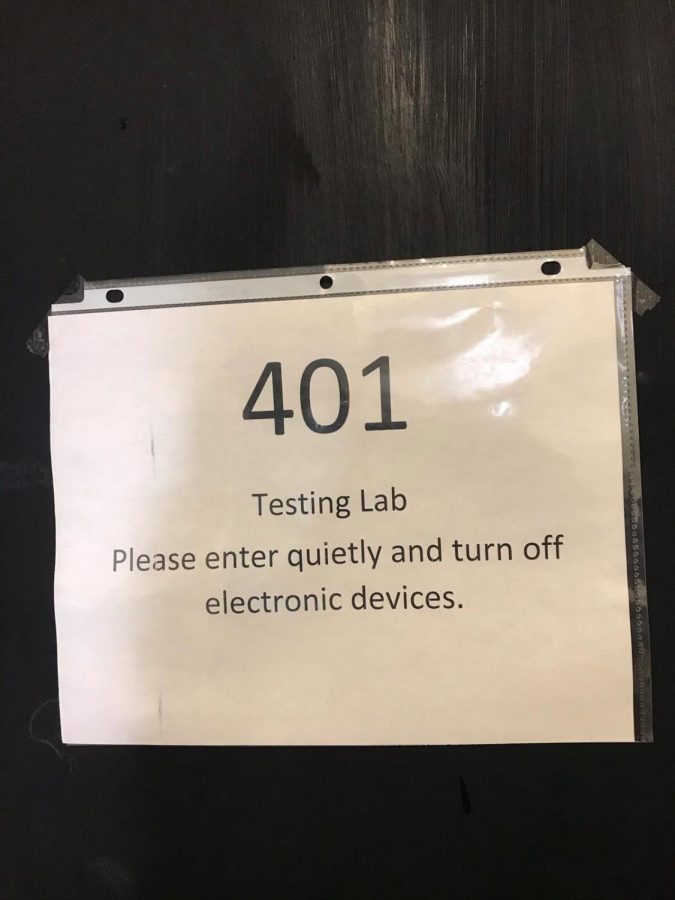Covid-19 causes testing changes
Due to the struggles during the ‘20-21 school year, the Florida Department of Education decided to ease up on state assessments and end-of-course exams, as well as Bright Futures qualifications for students.
After an unprecedented year for learning, a recent emergency order by the Florida Department of Education intends to ease up on the stress for teachers and students alike.
The order targets the spring Florida Standards Assessment (FSA)and end-of-course exams (EOCs). This year, while the exams are still taking place, they don’t have the same implications. Some classes such as Algebra 1, geometry, chemistry, biology, art and U.S. history, have this type of test, while many others do not. Typically, EOCs count for 30 percent of the overall course grade.
How well a student does on an EOC will determine if it impacts their grade. If the exam is taken and a student doesn’t do very well, it wouldn’t benefit their grade and won’t be used. But on the other hand, if a student does well, and the score can bring their grade up, it will be included on the student’s transcript and in Focus.
This is different from usual years because typically students wouldn’t have an option to not include the 30 percent EOC grade if they didn’t do well. For example, if a student gets an F in the first semester, and a B in the second semester, by doing well on the EOC, they can average their overall grade out to a C. But if they don’t take the exam at all, then that F will stay on their transcript and they will have to complete credit recovery.
So, while the state has eased up on the rules, it’s not free lunch.
“Everyone should take (the EOC) because it can do nothing but help,” assistant principal Joey Serra III said.
Several of these tests are required to graduate from high school. These include the 10th-grade reading and writing FSA, and the Algebra 1 EOC. Many freshmen missed their Algebra 1 EOC last year due to the school shutdown, but there is an exception for them to meet the graduation requirement. Because they were unable to take the test, the state is allowing students who are taking geometry this year, and missed the previous exam, to use a passing EOC score in lieu of a passing Algebra 2 EOC.
This rule only applies to students this year and intends to help them fulfill the graduation requirement. If they don’t take and pass the geometry exam, then they will still have to take Algebra 2 later. Any sophomore who hasn’t completed the algebra and FSA requirements will have to take it later before they graduate; there are no exemptions.
“I worry about this. … If a sophomore thinks they don’t have to take the test, (and) doesn’t take the reading and writing, (they are) officially off track for graduation,” Serra said.
Classes such as 3D and 2D Studio Art 1 normally have EOCs. However, the lack of materials and in-class instruction created a disadvantage for people online. Topics like print making and clay work were among those addressed on the test, things teachers weren’t able to teach. To make it fairer for at-home students, art teachers will be able to choose whether to administer the EOC, and if not, create another exam better geared toward what was covered.
“If (the kids at home) had to take that EOC, they wouldn’t have the same experience as the kids in class. It’s a wash this year,” art teacher Jayce Ganchou said. “We didn’t cover the same material that would be on it.”
These changes are good news for all seniors who have met their GPA and course requirements. If they are taking EOCs or the FSA, the test results will not be counted. The tests will still be administered, but they will not affect whether seniors graduate or not.
In addition to tests, there are two changes for Bright Futures Scholarships. The testing deadline has been extended for students to meet the minimum SAT or ACT scores, as well as the volunteer hours. Graduates who had planned but were unable to complete the required volunteer hours because the pandemic created a lack of opportunities or because of health concerns may still be eligible for the scholarship, but they should talk to their school counselor.
For Lakewood, the new rules bring a big relief. Every year, schools are issued a school grade depending on the success of the students in testing and class. In the past, Lakewood’s grade has been a C average. Now, all schools, depending on whether they are able to test over 90 percent of students, can choose to have their grade calculated or not. These changes, however, are not expected to carry over into next year.
“The decision will not affect next year, and the waiver is only good for the 2020-2021 school year, unless the pandemic takes a turn for the worst,” Savage said.
In an email to teachers, superintendent Michael Grego said that while the year has been difficult, he appreciates the work of students, families and staff.
“We know it has not been ideal for anyone involved, but we also know that by working together, we created the best outcomes possible for our students and community,” Grego said.

Hey, Lakewood! My name is Maya Rish. I’m the editor in chief and also a social media editor for SNN. I care deeply for our school community and strive...










